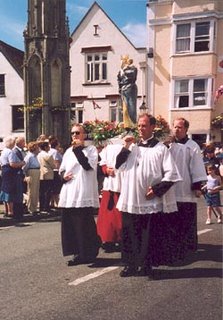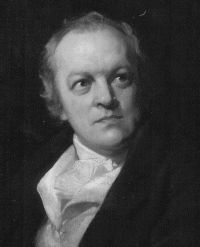 It was an interesting coincidence that on the same day chosen to represent modern British life in a mass diary project [see item below], the BBC broadcast a documentary on a popular song that has come to represent the aspirations of Britons from all walks of life. The BBC documentary 'Jerusalem': An Anthem For England? was actually produced in 2005, but went relatively unseen as it was shown on BBC's still hard-to-access new 'digital' channel, BBC4.
It was an interesting coincidence that on the same day chosen to represent modern British life in a mass diary project [see item below], the BBC broadcast a documentary on a popular song that has come to represent the aspirations of Britons from all walks of life. The BBC documentary 'Jerusalem': An Anthem For England? was actually produced in 2005, but went relatively unseen as it was shown on BBC's still hard-to-access new 'digital' channel, BBC4.This documentary on how an 1803 poem by a hard-to-understand artist and poet, William Blake [pictured], mystically inspired by England’s Holy Legend (of Jesus visiting England as a boy) came to be England's ‘alternative national anthem’ is worth seeking out as the best available introduction to the subject, and for this reason I have included a synopsis below.
It uses a range of musicians, artists, church spokesmen, politicians etc to tell the story in turn - Howard Goodall, Billy Bragg, Gary Bushell, Labour veteran Lord Hattersley, Tory MP Ann Widdecombe, and ex-Tory MP turned Classic-FM DJ David Mellor.
It tells how Poet Laureate Robert Bridges commissioned Blake's poem to be set to music in mid-WWI as an anthem of the 'Fight For Right' Movement of Britons backing the Great War - support for which was understandably starting to wane. Bridges published Blake's verses in an anthology, making the text accessible as a lyric people could learn to sing. In 1916, he asked composer Sir Hubert Parry to set it to music. Parry created a complex melodic development which does not head straight for the usual grand finale but has a complicated lead-in, swells to a climax, and then ends more diminuendo. In 1922 Sir Edward Elgar re-orchestrated the music to make it more demonstrative, giving it more 'oomph.'
 As a 'hymn' it had an immediate appeal in the public school milieu, but it was also taken up by 'a more radical tradition' - the Women's Suffrage Movement. The Women's Institute, which represents women in rural communities (of under 4,000 popn.) adopted it to start their meetings (many branches still do this).
As a 'hymn' it had an immediate appeal in the public school milieu, but it was also taken up by 'a more radical tradition' - the Women's Suffrage Movement. The Women's Institute, which represents women in rural communities (of under 4,000 popn.) adopted it to start their meetings (many branches still do this).The main political parties also used it to close their conferences (which was first to do so is not clear), and we see clips of this - Conservative, Labour, and finally BNP/National Front. Since then, attempts have been made by multicultural groups to 'take it back' from right-wing organisations, by having it performed and recorded by black and gay choirs (who can also sing it a lot better than the BNP). The Naturist Movement also sing it, there being one report that a visitor to Blake's house found him and his wife sunning themselves in their garden in the nude. (As David Mellor puts it, Blake was "a very alternative guy".) A Church Of England Canon explains why it isn't a 'hymn' (no mention of God), isn't even really Christian, and shouldn't be allowed in church. (Blake's remark is quoted about churches being 'synagogues of Satan.') The CoE spokesman also claims the Holy Legend the hymn’s opening lines allude to (about the boy Jesus visiting England, supposedly with his uncle Joseph of Arimatheia on a tin-trading trip), is a late (12th-13th) century creation. Another vicar says these arguments are misguided and foolish.The documentary ends with a complete, composite rendition, each of the interviewees singing a line in turn.





